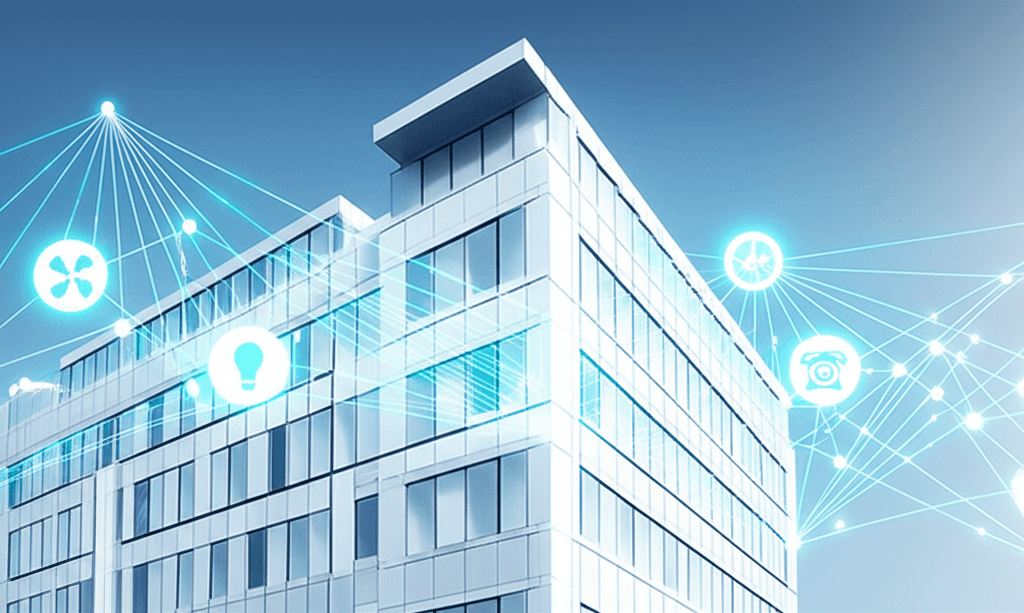Honeywell's AI Installs in Hours, Revolutionizing Smart Building Management
Honeywell's AI platform unifies building systems, offering rapid deployment and predictive insights for efficient, secure, and future-ready autonomous operations.
June 16, 2025

Honeywell has launched a new artificial intelligence-powered platform to transform how buildings are managed, addressing long-standing challenges of operational complexity, energy inefficiency, and cybersecurity. The technology, called Honeywell Connected Solutions, integrates various building software, systems, and devices into a single, unified interface.[1][2] Built upon the company's Forge platform for enterprise performance management, this new system aims to shift building operations from a reactive to a proactive and even autonomous model, providing facility managers with real-time data and actionable insights to enhance efficiency and occupant comfort.[3][4][5] The launch represents a significant move in the growing market for smart building technology, as operators face mounting pressure from aging infrastructure, rising energy costs, and a shortage of skilled labor.[1][3][6]
A core innovation of the Honeywell Connected Solutions platform is its AI-enabled installation process, which the company claims can be completed in a matter of hours, a dramatic reduction compared to the disruptive and costly timelines associated with traditional building management system (BMS) integrations.[2][4] This rapid deployment is a critical feature for facility managers, multi-site operators, and integrators who need to upgrade and connect building systems without significant downtime.[2][7] Once connected, the platform provides a comprehensive, real-time view of how critical systems are performing.[2] Early adopters of the technology include major corporations and institutions like Verizon Communications and Vanderbilt University.[1] Verizon is utilizing the platform to predict system issues before they escalate, while Vanderbilt has already implemented the solution in nearly 10% of its campus buildings to improve efficiency, cut energy use, and optimize the experience for students and staff, particularly in older facilities.[1][8]
The platform directly confronts several key issues facing modern building management.[2] Through predictive maintenance prompts, powered by machine learning algorithms, the system can identify potential equipment failures before they occur, allowing for proactive repairs that minimize downtime and extend the lifespan of assets.[8][9] It also features robust, advanced encryption to safeguard against the growing landscape of cyber threats targeting operational technology (OT) environments.[1][2][8] For day-to-day operations, the system offers remote monitoring and diagnostics, which can reduce labor time and costs by allowing technicians to troubleshoot issues without being physically on-site.[2][3] Furthermore, in an era of heightened focus on sustainability, the platform includes energy management solutions designed to support decarbonization efforts.[2] Buildings account for an estimated 30-37% of global energy consumption and carbon dioxide emissions, and intelligent systems like this are seen as crucial tools for identifying waste and optimizing performance to meet environmental, social, and governance (ESG) goals.[10][5][11]
The introduction of Honeywell Connected Solutions is emblematic of a broader industry shift towards autonomous buildings and the deeper integration of AI in facility management.[9][5] The convergence of IT and operational technology, facilitated by platforms like this, allows for the collection and analysis of vast amounts of data from sources such as IoT sensors, HVAC systems, and lighting controls.[12][13] This data-driven approach enables AI to make intelligent, real-time adjustments, such as modifying climate controls based on occupancy patterns to save energy without sacrificing comfort.[5][14] This move from automated to autonomous decision-making represents a pivotal evolution, empowering facility managers to transition from reactive problem-solvers to strategic planners who can use predictive insights for budgeting and capital expenditures.[14][11] Strategic collaborations, such as Honeywell's partnerships with semiconductor companies NXP and Analog Devices, are helping to accelerate this transition by embedding machine learning and enhanced digital connectivity directly into the hardware at the intelligent edge.[10][15]
In conclusion, Honeywell's new AI-driven platform marks a significant step forward in the digitalization of building management. By unifying disparate systems into an intelligent, cloud-based interface, Honeywell Connected Solutions offers a direct response to the pressing needs for enhanced operational efficiency, cybersecurity, and sustainability.[8][4] The platform's emphasis on AI-powered installation, predictive maintenance, and remote diagnostics promises to reduce labor costs and operational disruptions significantly.[6] As early adopters like Verizon and Vanderbilt University begin to quantify the benefits, the broader real estate and facility management industries will be watching closely, potentially signaling an accelerated adoption of AI as an indispensable tool for creating smarter, more efficient, and more resilient buildings.[1][8] The platform's ability to provide actionable, data-driven insights stands to elevate the role of the facility manager, empowering them to optimize building performance and contribute more strategically to their organization's overall success.[14]